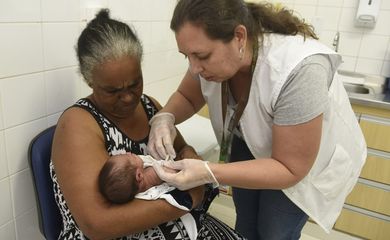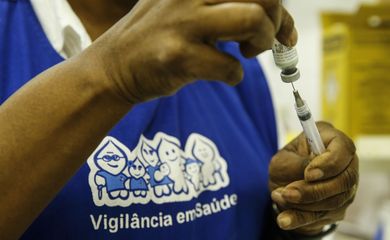Domestic vaccine production steps up Brazil’s sovereignty, planning

The weeks of waiting for shipments of active pharmaceutical ingredients to clear Chinese customs for the production of COVID-19 vaccines amid the spread of the Gamma variant in Brazil have shown just how dramatic a country’s dependence on health supplies can be. After the pandemic, even rich, developed nations have struggled with a shortage of supplies, as many had moved their national health industry outside their borders. As a result, these countries have redoubled their efforts to bolster suppliers at local level.

In the case of Brazil, the National Immunization Program (PNI)—which celebrates its 50th anniversary in 2023—is marked by the work of domestic vaccine producers. The Butantan Institute and research foundation Fiocruz supply most of the jabs, serums, and other immunobiologicals that make up a significant part of the plan, and that is one of the reasons mentioned by specialists explaining the program’s success.
The head of health at the United Nations Children’s Fund (Unicef) in Brazil, Luciana Phebo, pointed out that robust institutions capable of responding to such serious health problems is among the main privileges Brazilians have. The guaranteed supply of vaccines by such institutions, she argued, keeps the initiative running.
“It’s added value not just for the country, but for the whole world,” she declared. “The program is not only important for Brazil. It’s important for the whole world, even more so when dealing with viral diseases. Viruses don’t have passports.”
Public laboratories
The Butantan Institute, linked to the government of São Paulo state, is part of the back-up guaranteeing the supply to the immunization program. During the pandemic, for instance, the institute provided more than 115 million doses of CoronaVac. Every year, Butantan also delivers 80 million doses of the flu shot, in addition to producing immunization against hepatitis A, hepatitis B, HPV, dTpa, and rabies.
Butantan Medical Director Fernanda Boulos remarked that, even though public laboratories boost national autonomy, sovereignty should be further consolidated by guaranteeing supplies across all stages of production.
“Many of the supplies used in vaccine production are still imported. These institutions need to be strengthened so we can conduct a number of stages of the production process here, including the manufacture of active pharmaceutical ingredients, ensuring the capacity of local vaccine production,” she affirmed.
The institute also researches new vaccine technology. The laboratory is currently carrying out phase-3 clinical trials (the last before registration) of new candidate jabs against dengue, chikungunya, and influenza. “We’re optimistic about registering and making these vaccines available soon,” Boulos said.
In addition to vaccines, Butantan also supplies all antivenom serums distributed by the Ministry of Health to all regions of Brazil, to treat cases of poisoning by snakes, spiders, and scorpions.
Serving Brazil and the world
Friocruz’s Institute of Technology in Immunobiologicals—referred to as Bio-Manguinhos—controls the remaining portion of the vaccines under Brazil’s National Immunization Program. Its portfolio includes DTP, yellow fever, haemophilus influenzae B, meningitis A and C, 10-valent pneumococcal, COVID-19 (recombinant), inactivated poliomyelitis, oral poliomyelitis, tetravalent viral human rotavirus, triple virus, measles, and rubella (attenuated).
The institute is gradually taking over the production of the BCG immunization, in partnership with the Institute of Molecular Biology of Paraná (IBMP), after a crisis that led to the shutdown of the factory of the Ataulfo de Paiva Foundation (FAP)—the only institution that produced the BCG vaccine in Brazil.
Bio-Manguinhos Director Maurício Zuma stated that, in addition to Brazil, 70 other countries receive vaccines manufactured at Fiocruz, through the Pan-American Health Organization (PAHO), Unicef, and the Global Alliance for Vaccines and Immunization (Gavi). Most exported are the shots against yellow fever and meningococcal disease.
“Today, Bio-Manguinhos produces ten different vaccines, all of which part of the national vaccination plan. In 2022, we delivered over 120 million doses to the program—the average we usually deliver every year. In 2021 alone, the number surpassed 200 million, due to the COVID-19 pandemic,” Zuma recounted.
Economic complex
The recreation of the Executive Group of the Economic and Industrial Health Complex was one of the first moved by the Health Ministry, Minister Nísia Trindade declared in an interview with Agência Brasil.
“Our plan is to ensure over 70 percent of health goods are produced in the country in ten years, including vaccines, medicines, and supplies. We saw how essential that was during the COVID-19 pandemic, when we had to import active pharmaceutical ingredients for vaccines and so many other essential supplies, like masks and gloves. Brazil’s greater autonomy in the sector following the development of local industry makes the SUS [the country’s Unified Health Care System] stronger and ensures universal access to health, in addition to generating employment and income,” she said.
Brazil’s national infrastructure plan, the Growth Acceleration Program, or PAC, includes over BRL 8.9 billion earmarked for health care—BRL 6 billion of which for the production chain of vaccines, medicines, and equipment. Another BRL 2 billion should fund the construction and pre-operation of the factories on Fiocruz’s Santa Cruz campus, to be the largest production center for biological products in Latin America. The remaining BRL 895 million will be invested in the Hemobrás industrial park and in the qualification of Brazil’s blood network, which should have a direct impact on patients with hemophilia, facilitating access to treatment.
*Tâmara Freire from Rádio Nacional contributed to this article.
Dê sua opinião sobre a qualidade do conteúdo que você acessou.
Escolha sua manifestação em apenas um clique.
Você será direcionado(a) para o sistema Fala.BR, mas é com a EBC que estará dialogando. O Fala.BR é uma plataforma de comunicação da sociedade com a administração pública, por meio das Ouvidorias.
Sua opinião ajuda a EBC a melhorar os serviços e conteúdos ofertados ao cidadão. Por isso, não se esqueça de incluir na sua mensagem o link do conteúdo alvo de sua manifestação.
Clique aqui para mais informações sobre a Ouvidoria da EBC.










